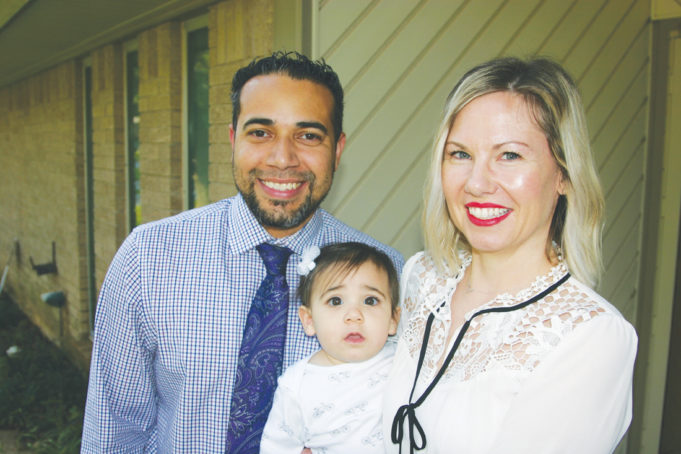The worker with the Arlington Water Utilities Department blamed the sewage backup on “gunk” – a build-up of grease, ois, hair, and who knows what else.
The result? Raw sewage seeped into the floors and walls of Stephanie and Steven Villaman’s house on Raydon Drive in mid-October. The damage was confined to about a third of the 1960s-era home. Still, the couple and their family vacated it temporarily.
“I have a 9-month-old daughter,” Stephanie said. “I don’t want her crawling around on sewer floors.”
Steven called a plumber, who said the pipes leading to the couple’s house were fine and that the problem appeared to have originated at the city’s main pipe that ran in front of the houses along the street. The Villamans said their neighbors reported minor sewage backups as well, although the muck didn’t seep into their houses.
Arlington Water Utilities maintains 1,151 miles of 6- to 15-inch sanitary sewer main that serves more than 390,000 Arlington residents. The department offers carpet cleanings by a private contractor as a courtesy to customers impacted by backups that originated in the city’s line. City records show that customers used the service nine times in 2017, 12 times in 2016, and eight times in 2015. The department proactively cleans 20 percent of its sanitary sewer main lines annually and targets areas where backups are more likely, City Spokesperson Traci Peterson said.
After the Villaman house suffered water damage, a Water Utilities official sent out a restoration contractor, who sprayed an antimicrobial solution on the impacted areas in the Villaman home and rigged up a dozen high-powered fans to air out the interior. Stephanie said the fans sounded like “freight trains” echoing through the house for several days. The moisture levels were still high in the floors and walls when the contractor asked the couple to sign a document, Stephanie said.
“I read over it, and it’s a waiver of liability from the city saying that we acknowledge that [the contractor] has cleaned and sanitized the affected areas and that we waive any and all liability of the city,” Stephanie said. “I said, ‘No, I’m not signing that.’ I thought it was the city’s negligence that caused this.”
The contractor immediately called Water Utilities, spoke with a city employee, and then yanked the fans from the house and left, even though the problems inside remained.
Stephanie, a Fort Worth attorney with family law experience, filed an online claim with the city’s Risk Management Department. A claims adjuster responded a couple of days later and said he would look into the complaint, but he added that a blocked pipe on the city’s line didn’t necessarily make the city liable.
Not long afterward, the Villamans received a letter from a risk consultant saying there is “no evidence that any action by the city or its employees contributed to your damages.”
The consultant cited Title 5, Chapter 101 in the Texas Civil Practice & Remedies Code, the statutory guide for civil litigation. The letter said the “condition contributing to the sewer line backup into your home was the result of a blockage made up of debris introduced into the line from further up the line. There is no evidence that any action by the city or its employees contributed to your damages.”
That’s when Stephanie, who thought she held a legal advantage, realized state law protects municipalities from liability except in egregious situations.
“Based on the information I found through precedents, the city would only be liable if there was some type of intent involved on the city’s part,” Stephanie said.
City workers have a duty to maintain basic functions such as sewage lines but aren’t always held liable for unexpected problems. Proving negligence would be difficult.
“It would be a battle of the experts” in court, Stephanie said.
Most likely a long and costly battle.
The Villamans filed a claim with their home insurance company and discovered their policy requires a $1,000 deductible and limits claims to $10,000 for sewage-related damages. The couple figures that will barely cover demolition, and they will pay many thousands of dollars of their own money to replace their house’s hardwood floor, baseboards, and wood-paneled walls.
“The laws are very lenient regarding municipalities,” Stephanie said.













That’s a hell of a lot of carpet cleaning for 390,000 residents. That private contractor and the Arlington Water Utilities budget must be taking a beating!!